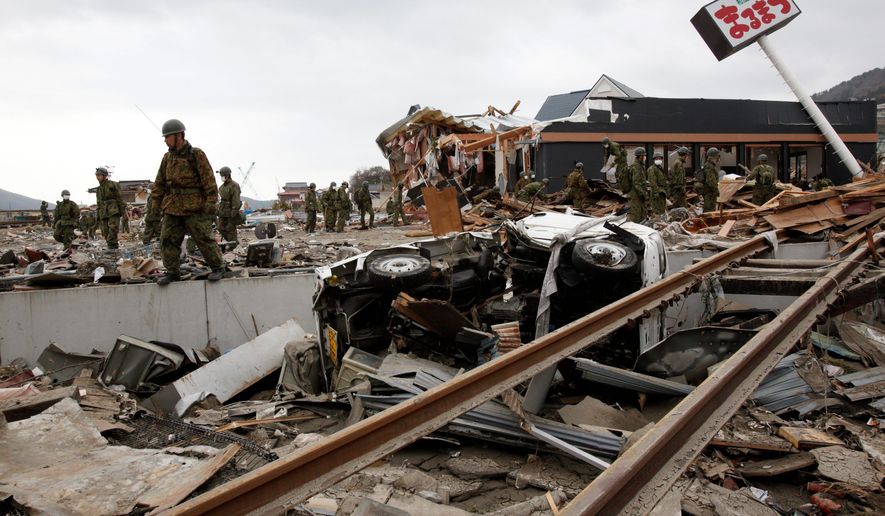SHIZUOKA, Japan | A quiet exodus from Tokyo began on Tuesday after another explosion and a fire at a nuclear-power plant in Fukushima sent radiation levels above normal in the capital and in other prefectures in the north and east of Japan.
Many fleeing Tokyo residents said they could no longer tolerate tremors jolting them out of bed, four days after the strongest earthquake to hit Japan in recorded history struck Friday, followed by a raging tsunami that may have claimed as many as 10,000 lives.
Many feared that a cloud of nuclear radiation could drift from the plant 170 miles northeast of the capital toward the Kanto Plain, home to about 30 million people in a vast metropolis including Tokyo and Yokohama.
The Tokyo metropolitan government said radiation levels surged to 23 times the normal level Tuesday in the capital.
“The possibility of further radioactive leakage is heightening,” Prime Minister Naoto Kan said in a TV address Tuesday morning. “We are making every effort to prevent the leak from spreading. I know that people are very worried, but I would like to ask you to act calmly.”
He said radiation spread from the four battered nuclear reactors of the Dai-ichi power plant in Fukushima prefecture, after an explosion in Unit 2 and a fire in Unit 4 on Tuesday.
The fire in a fuel-storage pond, where nuclear rods are cooled, sent radioactive gases into the air. Two workers were missing after the Tuesday blast.
“Radioactivity is being released directly into the atmosphere,” a Japanese official told the International Atomic Energy Agency.
Early Wednesday, another fire broke out at the Dai-ichi Unit 4, according to a spokesman for Tokyo Electric Power Co., elaborating that the new fire was the result of the earlier fire not having been completely extinguished.
Japan’s Nuclear and Industrial Safety Agency said later Wednesday morning that the flames had been put out, though smoke was still visible on Japanese TV and video feeds.
Hydrogen explosions caused by releasing pressure to prevent a nuclear meltdown hit Unit 1 on Saturday and Unit 3 on Monday.
The Tokyo Electric Power Co., the owner of the nuclear plant, said it could not rule out a meltdown, which would release radioactive material into snowstorms forecast for northern Japan. The company pulled out 750 workers, leaving just 50, and the government imposed a no-fly zone around the reactors.
More U.S. military crews on rescue missions were exposed to low-levels of radiation and decontaminated. The USS Reagan aircraft carrier strike group, which includes seven other ships, flew 29 missions Tuesday to deliver 17 tons of food and supplies.
The Russian Embassy in Tokyo said it is expecting a worst-case scenario of radioactive leakage. Joining several European embassies in advising citizens to leave the capital region, China said it will fly home Chinese from devastated areas, while the Indonesian government said it flew home 99 of its citizens living in the hard-hit Miyagi prefecture.
In Tokyo, increasing numbers of Japanese left the city, but there was no panicky mass exodus.
“I need to make money, but life is more important,” said Kenichi Okajima, a Tokyo office worker.
He said he decided to leave work after seeing the latest explosion and the weather report that the winds from north to south could potentially blow radioactive materials to Tokyo.
He said he planned to take his family to the mountains of Toyama, west of the capital.
“We have small children, and we don’t want to take any chances about them getting radiation sickness,” he said.
A Shinkansen bullet train speeding west from Tokyo was packed on Tuesday afternoon with mothers and children fleeing the city to hotels or homes of relatives across Japan while their husbands continued to work in Tokyo.
Yuichiro Sakata, a student in Tokyo, said his parents in central Japan called him after they saw the TV reports of the third explosion Tuesday morning. He didn’t want to leave.
“They said to me, ’Hurry up. You must come home right now.’”
Heeding warnings from the embassies of France, Germany, China and other countries, many foreigners boardedtrains and headed for airports across Japan because of “superlong lines” at Narita International Airport outside Tokyo, as one city resident said on Twitter.
While some foreigners vowed to stay in Tokyo and ride out the wave of fear, many foreigners with Japanese spouses and children opted to leave the city to save their children from the risk of thyroid cancer from overexposure to radiation.
Fred Varcoe, a professor and writer who lives with his Korean wife and daughter on the Chiba coast east of Tokyo, drove to escape to a hotel in Shimizu, near the Mount Fuji volcano about 60 miles west of Tokyo.
He said he was lucky to find an open gas station, amid reports of fuel shortages across the Tokyo area and the devastated prefectures of northern Honshu island.
South from Fukushima, radiation measured at 100 times the normal level in Ibaraki, a prefecture bordering Tokyo, Kyodo News reported, citing Japanese officials. About eight hours after the explosions, the U.N. weather agency said winds were blowing particles over the Pacific Ocean.




Please read our comment policy before commenting.